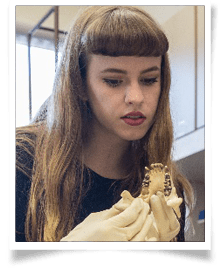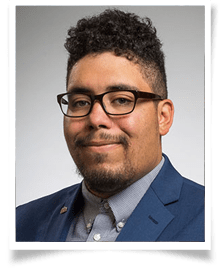2023 Scholars 2022 Scholars 2021 Scholars 2019 Scholars 2018 Scholars
The Ohio State University is pleased to announce the selection of 10 scholars as the 2020 cohort of President’s Postdoctoral Scholars. The recipients were selected from a diverse and highly competitive pool of national and international applicants.
2020 Scholars:
Faculty Mentor(s): Guramrit Singh and Sharon Amacher, Department of Molecular Genetics
René earned her BS in Biochemistry from Purdue University and her PhD in Biological Chemistry from the University of Michigan. As a graduate student, her research focused on dissecting the molecular mechanisms of Pumilio, a developmentally critical regulator of messenger RNAs (mRNAs). In graduate school, René was supported by the National Science Foundation Graduate Research Fellowship Program and held multiple roles in science outreach organizations that promote diversity in STEM. She is currently a co-mentored postdoctoral researcher in the labs of Dr. Guramrit Singh and Dr. Sharon Amacher in the Department of Molecular Genetics. Her research focus is studying how mRNA quality control is regulated in vivo during development, using zebrafish as a model system. Her goal is to better understand the context specific nature of mRNA regulatory processes and how these can impact development and potentiate disease.
 Shanna Hamilton
Shanna Hamilton
Faculty Mentor: Dmitry Terentyev, Department of Physiology and Cell Biology
Shanna received her BSc in Biochemistry from Swansea University, UK, and her PhD in Medicine and Biophysics from Cardiff University, UK, where she investigated mutations in the ryanodine receptor associated with cardiac disease and ventricular arrhythmias. Under the mentorship of Dr. Dmitry Terentyev in the Department of Physiology and Cell Biology, she now studies the regulation of calcium dynamics and mechanisms of arrhythmia in multiple cardiac disease models. Shanna has developed novel molecular tools to measure calcium, reactive oxygen species and potassium within different compartments of the cardiac myocyte. Her overall goal is to fill significant gaps in our understanding of how calcium signaling and oxidative stress control cardiovascular physiology, in order to design better therapeutic strategies for patients.
 Kathryn Kroeper
Kathryn Kroeper
Faculty Mentor: Steven Spencer, Social Psychology
Kathryn Kroeper earned her BA from Rutgers University with an exceptional record and has gone on to complete her PhD in social psychology at Indiana University. The central goal of her research is to identify and mitigate unfair inequities between members of traditionally advantaged and disadvantaged social groups. More specifically, she seeks to understand how people and organizations can structure social environments to provide everyone with the equal opportunity to flourish. Her research is grounded in social identity threat theory. According to the theory, people belonging to socially stigmatized groups reasonably worry that—because of their social identity (e.g., their race, gender, class, or age)—they will be devalued or dismissed in particular settings. Over time, identity-related worries stoke anxiety, sap motivation and undermine performance, which perpetuate opportunity gaps in academic and workplace settings. In some of Kathryn’s research, she identifies situational cues—like norms, values, beliefs, policies and practices—that give rise to social identity-related worries. In her other research, Kathryn leverages these insights to design, implement and evaluate interventions aimed at changing identity-threatening environments into identity-safe settings where people of all backgrounds can thrive. Kathryn’s research examines these social issues from a variety of perspectives (targets, perceivers and organizations), using multiple methods (experiments, surveys, interviews and audit studies). Her work is interdisciplinary, appearing in peer-reviewed psychological, educational and legal outlets. At Ohio State, she plans to extend this line of work with Steven Spencer, one of the original theorists behind social identity threat theory.
*UPDATE: Dr. Kroeper is currently an Assistant Professor in the Psychology Department at the Sacred Heart University.
 Allen Mallory
Allen Mallory
Faculty Mentor(s): Natasha Slesnick and Claire Kamp Dush, Human Development and Family Science
Allen received his bachelor’s degree in Psychology and Cognitive Science from Case Western Reserve University, his master’s degree in Couple and Family Therapy from Kansas State University, and he will complete his PhD in Human Development and Family Science in August 2020 at the University of Texas at Austin. His research focuses on risk and protective factors for the health and well-being of sexual and gender minority people. His dissertation research examines how intersections of race, sexual orientation and gender discrimination relate to the long-term mental health of sexual minority youth and adults. This research is in part funded by Ruth L. Kirschstein National Research Service Award Individual Predoctoral Fellowship through the National Institute of Mental Health. He has co-authored twelve publications in and one book chapter, four of which he is first author. At The Ohio State University, he will build upon his dissertation research to examine how couples’ dynamics can help to mitigate the negative association between stigma and health among racially, ethnically and gender diverse same-sex couples. Ultimately, Allen’s goal is to produce high quality and rigorous research that can be translated to inform policy, improve the well-being of sexual and gender minority people and be useful for a lay audience.
*UPDATE: Dr. Mallory is currently an Assistant Professor in the Human Sciences Department at the Ohio State University.
 Katie McGrath
Katie McGrath
Faculty Mentor(s): Debra Guatelli-Steinberg, Anthropology and John D. Bartlett, Biosciences
Kate McGrath is a biological anthropologist interested in how early life stress affects growth and development. She received her BS in Anthropology from the College of Charleston in 2010. From 2011-2012, she was an imaging contractor at the Smithsonian’s National Museum of Natural History. She received her PhD in Human Paleobiology from The George Washington University in 2018 where she studied stress-related dental defects in great apes, focusing on wild mountain gorillas with associated life history information. Upon finishing her PhD, she moved to France as an EU-funded Marie Sklodowska-Curie Actions Fellow at Université de Bordeaux, where she continued her analyses of skeletal stress markers in great apes.
Kate is currently using the method she developed in her PhD to quantify dental stress markers in contemporary and fossil human teeth. This is important because the visual depth of defects is often used as a proxy for stress severity experienced during early life. However, her 2019 study shows that the majority of variation in defect depth among great apes actually relates to variation in enamel growth rates, with faster-growing canines having shallower defects at the population level. This builds on her 2018 paper demonstrating clear species differences in defect depth among great apes, with the faster-developing mountain gorillas having shallower defects than other species. Recent results further support this relationship – Neanderthals have been shown to have faster growth rates in their anterior teeth, and they also have shallower defects compared to three different H. sapiens samples.
At Ohio State, she worked with Debbie Guatelli-Steinberg and John Bartlett, directly testing the hypotheses that arose from her earlier work, like whether defect depth correlates with enamel and somatic growth rates at the population level. She studied dental defects and asymmetry in a diverse sample, including contemporary humans, human ancestors and nonhuman primates.
*UPDATE: Dr. McGrath is currently an Assistant Professor of Biological Anthropology at the State University of New York College at Oneonta.
 Joe Sharick
Joe Sharick
Faculty Mentor(s): Jennifer Leight, Biomaterials and Larry Kirschner, Endocrinology
Joe received his BSE in Biomedical Engineering from Duke University and his MS and PhD in Biomedical Engineering from Vanderbilt University. His research interests are centered around engineering new in vitro and in vivo models of cancer to accelerate the development of new cancer treatments and tailor treatment plans for individual patients. His PhD thesis work focused on the development of optical metabolic imaging, a novel method for detecting lethal drug-resistant subpopulations of cells hidden within a patient’s tumor. By collaborating across disciplines with surgeons, oncologists and pathologists, he demonstrated that this technique could predict how individual pancreatic cancer patients would respond to treatment after surgery. Joe’s research was supported by a Graduate Research Fellowship from the NSF.
Joe is currently a postdoctoral researcher at The Ohio State University, co-mentored by Dr. Jennifer Leight in the Biomedical Engineering Department and Dr. Larry Kirschner, a member of the Molecular Biology and Cancer Genetics Program at the Ohio State Comprehensive Cancer Center. He is developing new biomaterials functionalized with fluorescent biosensors and using them to study how thyroid cancer cells become metastatic. Joe plans to then translate this biomaterial as a predictive technology in the clinic to determine the metastatic potential of individual patient tumors.
*UPDATE: Dr. Sharick is currently a Commercial Translational Architect at the Office of Innovation and Economic Development, The Ohio State University
 Rosie Shrout
Rosie Shrout
Faculty Mentor: Janice Kiecolt-Glaser, Institute for Behavioral Medicine Research
Rosie Shrout earned her PhD in Social Psychology from the University of Nevada, Reno in 2019. Prior to her doctoral training, Rosie worked as a Health Policy Analyst at Excellus BlueCross BlueShield where wrote empirically-based reports on the public health impact of chronic illness, as well as a Research Program Assistant at Johns Hopkins University where she studied the toll chronic illness took on patients and their families. This work experience informed Rosie’s graduate research on how stress experienced by couples with chronic illness wears on their relationships and can impact both partners’ health, which earned her a competitive dissertation fellowship and the award for the most Outstanding Graduate Student Researcher at UNR in 2019. As a postdoctoral scholar, Rosie will draw on biological and psychological research to address how stress and chronic illness influence the autonomic nervous system, the endocrine system and the immune system in patients and their partners. Stress in couples’ relationships heightens their risk for early mortality and morbidity, including inflammation-related disorders such as cardiovascular disease, metabolic syndrome and diabetes. Her work will address how the consequences of stress are intensified among couples with chronic illness, providing insight into their long-term health, with the goal of informing future interventions for those most at risk. Rosie’s program of research will have broad transdisciplinary impact on how chronic stress and illness impact health, facilitating a more comprehensive understanding into the biobehavioral pathways that enhance or harm patients’ and their partners’ longevity and quality of life.
UPDATE: Dr. Shrout is currently an Assistant Professor in the Human Development and Family Studies Department at Purdue University .
 Deondre Smiles
Deondre Smiles
Faculty Mentor: Margaret Newell, Early American/Native American/Economic History
Deondre Smiles is a PhD candidate in the Department of Geography and is a citizen of the Leech Lake Band of Ojibwe. His research interests include Indigenous geographies, science and technology studies and tribal cultural resource protection/preservation. His current dissertation research focuses on historical and contemporary disrespect and disturbances of deceased Indigenous bodies and Indigenous burial grounds in his home state of Minnesota. Deondre is involved in various Indigenous-related organizations and initiatives in academia; he has served in multiple leadership positions with the Indigenous Peoples Specialty Group of the American Association of Geographers, including an upcoming term (2020-2021) as the Specialty Group’s chair, as well as serving as the President of Ohio State’s Indigenous Community of Graduate and Professional students for three years (2017-2020). Deondre has published in leading journals such as Geoforum and the International Journal of Listening and also has served as a book reviewer for publications such as American Indian Quarterly, the American Indian Culture and Research Journal and Great Plains Quarterly. Besides his forthcoming PhD in Geography from The Ohio State University, Deondre holds a bachelor’s degree in Geography from Saint Cloud State University, and a master’s degree in Liberal Studies/Global Indigenous Studies from the University of Minnesota, Duluth.
UPDATE: Dr. Smiles is currently an Assistant Professor in the Geography Department at University of Victoria.
 Tianlin Wang
Tianlin Wang
Faculty Mentor: Joel Johnson, Electrical and Computer Engineering
Tianlin Wang received his PhD in Electrical Engineering in 2020 from the University of Michigan. His research contributes directly to the Cyclone Global Navigation Satellite System NASA (CYGNSS) Earth Venture mission, a constellation of eight satellites in Earth orbit used for sensing wind speeds over the ocean. His research interests include applied electromagnetics, microwave remote sensing and radio frequency (RF) circuits. Dr. Wang’s project will focus on extending CYGNSS measurements into the measurement of soil moisture and inundation over land surfaces.
 Kristina Wicke
Kristina Wicke
Faculty Mentor: Laura Kubatko, Mathematical Biology
Kristina obtained her bachelor’s and master’s degrees in Biomathematics from the University of Greifswald in Germany. She is currently a PhD candidate in Biomathematics at the University of Greifswald and will graduate in early summer 2020. Her research focus lies in mathematical phylogenetics, i.e. the mathematical study (and theory) of the evolutionary history and relationships among groups of species. At Ohio State, she will analyze the effect of discordance between species and gene histories on phylogenetic diversity indices and its impact on biodiversity conservation.
*UPDATE: Dr. Wicke recently is an Assistant Professor the Mathematical Sciences Department at the New Jersey Institute of Technology (NJIT).

